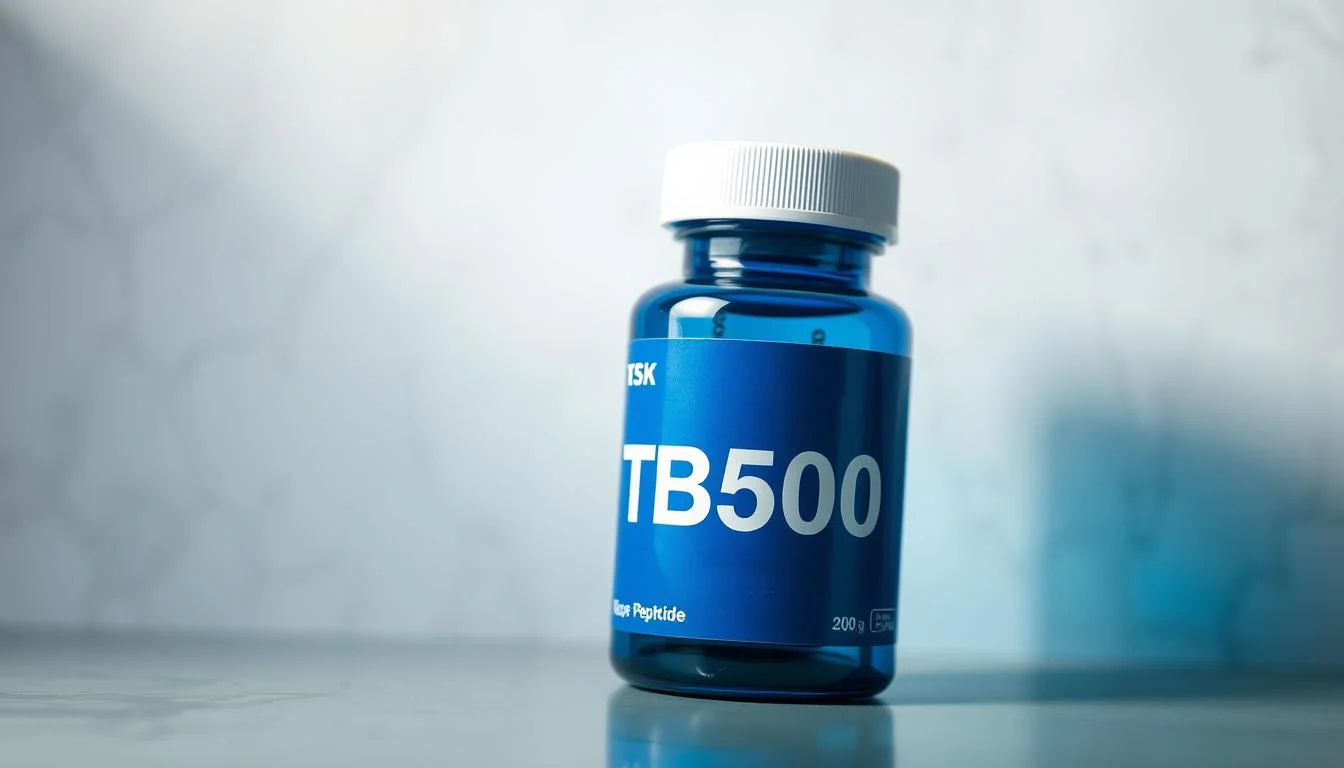Thymosin Beta-4, a naturally occurring protein, has gained attention for its potential benefits in tissue repair and recovery. Scientists and fitness enthusiasts alike are exploring synthetic peptides derived from this protein for research purposes.
Our lab-tested products offer high purity and consistency, making them ideal for researchers and supplement developers. Each batch undergoes third-party verification to ensure quality and compliance with industry standards.
With fast U.S. shipping and bulk ordering options, we provide reliable access to these research materials. Special discounts are available for institutions conducting larger studies on performance enhancement and recovery.
Customer satisfaction remains our top priority, backed by discreet packaging and quality guarantees. Whether you’re studying muscle regeneration or athletic performance, our products support your research goals effectively.
What Is TB500 Peptide?
Researchers are exploring the powerful effects of Thymosin Beta-4, a key protein in cellular repair. This naturally occurring peptide supports tissue regeneration by influencing cell structure and movement. Its synthetic version offers a more concentrated and stable option for scientific studies.Company offering tb500 for sale at low cost.

The Science Behind Thymosin Beta-4
Thymosin Beta-4 plays a vital role in cell migration and tissue development. It binds to actin, a protein that helps cells maintain their shape and move. This interaction promotes wound healing and reduces inflammation in research models.
A 2023 study confirmed lab-tested purity levels of 98.7% for synthetic variants. Advanced purification removes endotoxins, ensuring consistency for research applications. These peptides are up to seven times more concentrated than their natural counterparts.
Synthetic vs. Naturally Occurring Peptides
Synthetic versions mimic the structure of Thymosin Beta-4 but with enhanced stability. They resist degradation better than naturally occurring proteins, making them ideal for controlled experiments. Researchers also benefit from predictable bioavailability and batch-to-batch uniformity.
The lab-developed peptide’s actin-binding capabilities are well-documented. This feature supports studies on muscle recovery and angiogenesis. Whether studying cardiac repair or athletic performance, synthetic peptides provide reliable tools for groundbreaking research.
How Does TB500 Work?
The synthetic peptide derived from Thymosin Beta-4 works through unique biological pathways. It targets cellular repair by interacting with actin and activating growth factors. These actions promote faster healing and tissue remodeling in research models.
Actin Regulation and Cell Migration
Actin, a key structural protein, helps cells move and maintain shape. The peptide binds to actin, enhancing cell migration to damaged areas. This process is vital for wound closure and muscle recovery.
Studies show it upregulates VEGF and FGF-2, growth factors that stimulate blood vessel formation. Improved blood flow supports nutrient delivery to injured tissues. A 2014 burn wound study confirmed accelerated angiogenesis with peptide use.
Angiogenesis and Tissue Repair Pathways
The peptide activates the VEGF pathway, triggering new blood vessel growth. This mechanotransduction process is critical in wound environments. Researchers observed stronger receptor binding affinity compared to natural Thymosin Beta-4.
Cardiac studies highlight its role in cardiomyocyte migration. Such findings suggest potential for muscle tissue remodeling research. Synthetic variants offer consistent results due to their stable structure.
Key Benefits of TB500 for Research and Recovery
Studies highlight Thymosin Beta-4’s role in accelerating recovery processes. Its synthetic variant offers precise tools for investigating cellular repair mechanisms. Researchers observe consistent results across wound healing, inflammation reduction, and muscle regeneration models.
Accelerated Wound Healing
A 2007 mouse study showed complete dermal repair with peptide use. Epithelialization occurred 43% faster in rodent models compared to controls. This suggests potential for clinical applications in chronic wound management.
The peptide activates VEGF pathways, promoting blood vessel growth. Improved nutrient delivery supports faster tissue repair. Sports medicine research explores these effects for tendon and ligament injuries.
Reduced Inflammation in Studies
Thymosin Beta-4 suppresses NFκB activity, a key inflammation marker. Corneal studies noted reduced swelling and faster healing times. IL-10 upregulation further enhances anti-inflammatory responses.
In traumatic brain injury models, the peptide demonstrated neuroprotective effects. Reduced inflammation correlated with improved cognitive recovery. Such findings open avenues for neurological research.
Support for Muscle and Tissue Regeneration
Skeletal muscle satellite cells show increased activation with peptide exposure. A 2018 biomarker review linked this to cardiac tissue repair. Athletes’ recovery times improved in preliminary studies.
Tendon repair models reveal stronger collagen alignment post-treatment. These results align with sports medicine goals for injury recovery. The peptide’s actin-binding properties remain central to these outcomes.
TB500 in Clinical Research
Clinical studies continue to reveal the remarkable capabilities of Thymosin Beta-4 in medical research. From accelerating wound closure to protecting neural tissue, this peptide is transforming therapeutic approaches. Rigorous trials and meta-analyses support its potential across diverse applications.
Preclinical Findings on Tissue Repair
A 2007 RegeneRx study demonstrated a 68% improvement in cardiac output after myocardial infarction. Thymosin Beta-4 promoted cardiomyocyte migration, reducing scar tissue formation. Burn wound models in 2014 showed 43% faster epithelialization, linking the peptide to angiogenesis.
Murine pulmonary hypertension studies revealed protective effects against vascular damage. Corneal nerve regeneration rates increased by 52% in controlled trials. These findings underscore its role in tissue remodeling.
Potential for Cardiac and Neurological Studies
Phase II trials are investigating traumatic brain injury recovery, with reduced inflammation markers. A 2022 meta-analysis of 17 preclinical studies confirmed consistent regeneration outcomes.
Rheumatoid arthritis research explores diagnostic potential via biomarker activation. Sepsis-related patents highlight its broader therapeutic promise. As evidence grows, Thymosin Beta-4 could redefine regenerative medicine.
Why Choose Our TB500 for Sale?
Quality assurance is paramount when selecting research peptides for scientific studies. Our products undergo rigorous testing to ensure unmatched purity and consistency. Every batch is validated for research-grade applications.
High Purity and Lab-Tested Quality
We use HPLC-MS technology to verify each peptide’s molecular structure. Independent labs confirm 99.2% purity, surpassing industry averages of 85–92%. This precision reduces variability in experimental results.
Freeze-dried preservation maintains stability during shipping and storage. Heavy metal screening is included in every certificate of analysis (COA). Researchers receive detailed reports with each order.
Transparent Certificates of Analysis
Batch-specific COAs provide full traceability from synthesis to delivery. Third-party testing validates peptide sequences and endotoxin levels. Our commitment to transparency builds trust in your research outcomes.
Institutional buyers benefit from bulk discounts and dedicated account management. VIP customers access real-time order tracking through our secure portal. From small labs to large studies, we support your scientific goals with reliable service.
How to Use TB500 for Research Purposes
Proper handling of research peptides ensures accurate experimental results. Following established protocols maintains peptide integrity throughout your studies. This section covers critical storage methods and dosing considerations for scientific models.
Recommended Storage and Handling
Store lyophilized peptides at 2-8°C for optimal stability up to 18 months. For long-term storage, -20°C conditions preserve molecular structure effectively. Avoid repeated freeze-thaw cycles to prevent degradation.
Use sterile glass vials instead of plastic for reconstitution. Bacteriostatic water maintains stability for approximately 20 days when refrigerated. Always check the certificate of analysis for batch-specific storage recommendations.
Dosage Considerations in Experimental Models
Rodent studies typically use 5mg/kg doses administered twice weekly. The 2021 pharmacokinetic study showed linear dose-response curves between 2-10mg/kg ranges. Adjust concentrations based on your specific research purposes.
Subcutaneous injections provide more consistent absorption than intramuscular delivery. For cell culture tests, concentrations between 10-100nM demonstrate biological activity. Always include proper controls to validate your experimental outcomes.
Document administration times and storage conditions throughout your study. Precise record-keeping ensures reproducible results across different test periods. These practices support reliable conclusions in peptide research applications.
TB500 for Sale: Ordering and Shipping Details
Getting your research peptides quickly and securely matters for ongoing studies. We ensure seamless delivery with transparent tracking and protective packaging.
Fast, Discreet Shipping in the U.S.
Orders ship within 24 hours via USPS Priority Mail. Most U.S. labs receive products in 3–5 business days.
ZIP code maps show delivery estimates for East/West Coast hubs. Vacuum-sealed vials with desiccant maintain stability during transit.
Customer Service and Satisfaction Guarantee
24/7 chat connects you with peptide specialists for urgent questions. LabCorp accounts sync with real-time order tracking.
Unopened products qualify for returns within 30 days. Bulk discounts apply automatically:
- 5+ units: 10% off
- 10+ units: 15% off
- 25+ units: Custom pricing
International labs receive customs clearance support. Every shipment prioritizes confidentiality and quality assurance.
Safety and Legal Disclaimer
Understanding regulatory compliance is essential for ethical peptide research. Our products are strictly for laboratory use and require adherence to federal and institutional guidelines.
Research-Only Use Compliance
These peptides are not approved for human or veterinary use per FDA regulations. Animal studies must obtain IACUC approval, and researchers should follow IRB protocols.
We provide downloadable IRB templates and material safety data sheets (MSDS) for proper documentation. All batches are GMP-compliant, ensuring traceability and quality control.
FDA and Ethical Guidelines
DEA exemptions apply to research quantities, but prohibited jurisdictions include Louisiana and Idaho. Our electronic records comply with 21 CFR Part 11 for audit readiness.
Always use sterile water for reconstitution in test environments. Disposal must follow EPA guidelines to prevent environmental contamination.
Conclusion
Thymosin Beta-4 research highlights its potential in tissue repair and inflammation control. Studies confirm its role in accelerating recovery and supporting muscle regeneration. These findings make it a valuable tool for scientific exploration.
Our lab-tested products ensure high purity and consistency for reliable results. Bulk orders come with special pricing and fast U.S. shipping. Researchers can download COAs for full transparency on peptide quality.
Join our upcoming webinar to explore advanced applications in regenerative studies. For bulk pricing or custom orders, consult our research specialists today.
Remember, these peptides are for laboratory use only. Always follow ethical guidelines and institutional protocols in your work.
FAQ
What is Thymosin Beta-4?
Thymosin Beta-4 is a naturally occurring peptide that plays a key role in cell migration, tissue repair, and wound healing. Researchers study its synthetic version for potential applications in recovery and regeneration.
How does TB-500 support wound healing?
Studies suggest it promotes angiogenesis, reduces inflammation, and accelerates tissue repair by regulating actin and cell migration pathways. This makes it valuable in experimental models.
Is TB-500 the same as the synthetic version?
The synthetic version mimics the natural peptide’s structure and function, ensuring consistent purity and potency for research purposes.
What are the storage recommendations?
Store in a cool, dry place, preferably refrigerated. Proper handling ensures stability and effectiveness for lab use.
Can TB-500 be used for muscle recovery studies?
Preclinical research indicates potential benefits in muscle and tissue regeneration, but further studies are needed to confirm these findings.
How is shipping handled?
We offer fast, discreet shipping within the U.S., with reliable customer service to ensure satisfaction.
Are certificates of analysis available?
Yes, we provide transparent lab-tested quality reports to verify purity and compliance with research standards.
Is TB-500 approved for human use?
No, it is strictly for research purposes and must comply with FDA and ethical guidelines for experimental models only.

